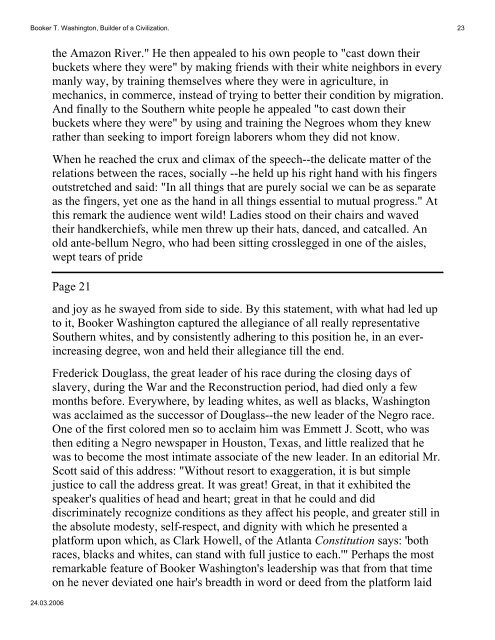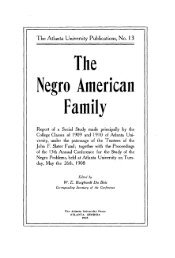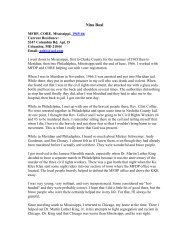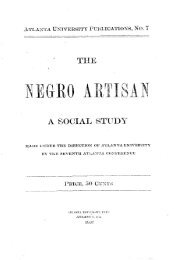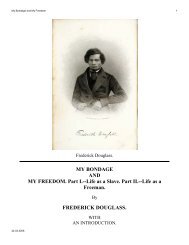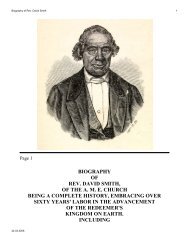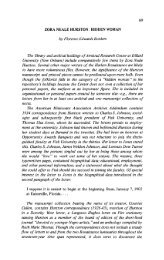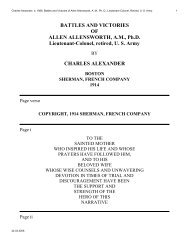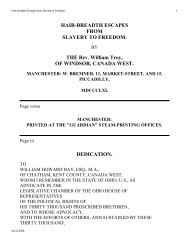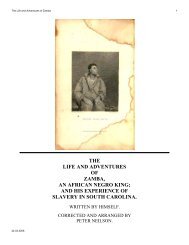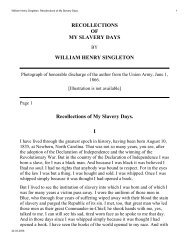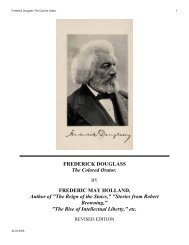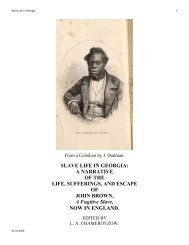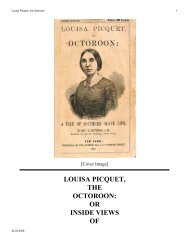Booker T. Washington, Builder o - African American History
Booker T. Washington, Builder o - African American History
Booker T. Washington, Builder o - African American History
You also want an ePaper? Increase the reach of your titles
YUMPU automatically turns print PDFs into web optimized ePapers that Google loves.
<strong>Booker</strong> T. <strong>Washington</strong>, <strong>Builder</strong> of a Civilization. 23<br />
24.03.2006<br />
the Amazon River." He then appealed to his own people to "cast down their<br />
buckets where they were" by making friends with their white neighbors in every<br />
manly way, by training themselves where they were in agriculture, in<br />
mechanics, in commerce, instead of trying to better their condition by migration.<br />
And finally to the Southern white people he appealed "to cast down their<br />
buckets where they were" by using and training the Negroes whom they knew<br />
rather than seeking to import foreign laborers whom they did not know.<br />
When he reached the crux and climax of the speech--the delicate matter of the<br />
relations between the races, socially --he held up his right hand with his fingers<br />
outstretched and said: "In all things that are purely social we can be as separate<br />
as the fingers, yet one as the hand in all things essential to mutual progress." At<br />
this remark the audience went wild! Ladies stood on their chairs and waved<br />
their handkerchiefs, while men threw up their hats, danced, and catcalled. An<br />
old ante-bellum Negro, who had been sitting crosslegged in one of the aisles,<br />
wept tears of pride<br />
Page 21<br />
and joy as he swayed from side to side. By this statement, with what had led up<br />
to it, <strong>Booker</strong> <strong>Washington</strong> captured the allegiance of all really representative<br />
Southern whites, and by consistently adhering to this position he, in an everincreasing<br />
degree, won and held their allegiance till the end.<br />
Frederick Douglass, the great leader of his race during the closing days of<br />
slavery, during the War and the Reconstruction period, had died only a few<br />
months before. Everywhere, by leading whites, as well as blacks, <strong>Washington</strong><br />
was acclaimed as the successor of Douglass--the new leader of the Negro race.<br />
One of the first colored men so to acclaim him was Emmett J. Scott, who was<br />
then editing a Negro newspaper in Houston, Texas, and little realized that he<br />
was to become the most intimate associate of the new leader. In an editorial Mr.<br />
Scott said of this address: "Without resort to exaggeration, it is but simple<br />
justice to call the address great. It was great! Great, in that it exhibited the<br />
speaker's qualities of head and heart; great in that he could and did<br />
discriminately recognize conditions as they affect his people, and greater still in<br />
the absolute modesty, self-respect, and dignity with which he presented a<br />
platform upon which, as Clark Howell, of the Atlanta Constitution says: 'both<br />
races, blacks and whites, can stand with full justice to each.'" Perhaps the most<br />
remarkable feature of <strong>Booker</strong> <strong>Washington</strong>'s leadership was that from that time<br />
on he never deviated one hair's breadth in word or deed from the platform laid


